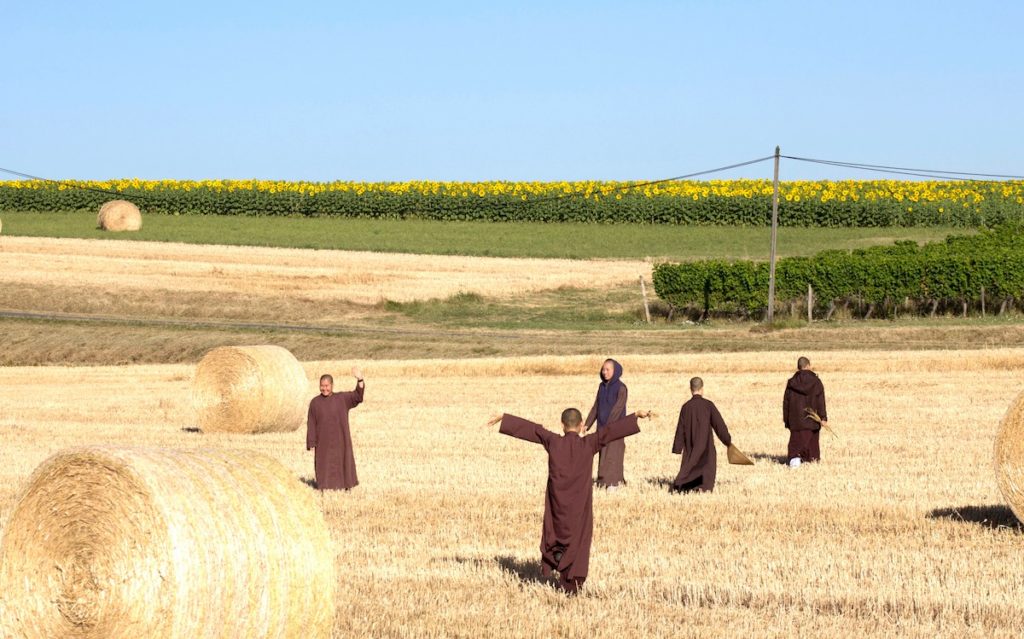
Written by a Plum Village monastic
Part I
I wanted to connect with Sanghas outside Plum Village, see what’s going on, and try to get a sense of context for what our tradition is doing, because my experience with Plum Village has been entirely through Plum Village France. Basically, I came to Plum Village and ordained as a monastic. I had no experience with lay Sangha building. For the first few years of my monastic life, I probably would have told you that if you wanted to practice you should become a monk or a nun.
Over time, I started to get to know people who didn’t seem to be limited by lay life, as far as what they’ve been able to achieve in the practice. This opened up questions about how our tradition can have an impact and the different ways that the practice can manifest in different lifestyles. I took a six-month sabbatical a couple years ago and connected with a number of Sanghas and I’ve had a few other opportunities to have informal connections with Sanghas.
I find a lot of diversity in Sanghas and many people dedicated to the practice. I generally find–and that’s my perspective–that there’s a lack of access to mentorship and a lack of access to inspiring role models in the flesh. There’s also a lack of development of Plum Village Dharma doors specifically adapted to a lay environment or an urban environment, a world where there isn’t a wake up bell in the morning. When we eat breakfast, we’re not surrounded by people who are eating breakfast mindfully. I think that the practice that Thay has offered is flexible at its base. Then the issue is: Are we taking any time to develop different expressions of the practice that are adapted to different contexts?
I think one of the trickiest things is to develop the view of interbeing when it comes to approaching things either with an individual perspective or a collective perspective. When I’m in Plum Village, I’m approaching the practice with a collective perspective. We have all kinds of reminders around Plum Village to encourage us to engage in the practice in that way. We have a sign at the entrance to the meditation path that says, “Go As a River,” for example; we have a schedule that is already determined for us. When we’re in Plum Village, we’re outsourcing our intention to practice to the environment, which is powerful because we can then release some of the holding that we’re doing.
But in Buddhism and meditation, these practices just support developing a direct experience of things. If we come to Plum Village, we hear about the importance of collective energy and maybe a lot of scary talk about consumption and guarding the senses. Then we may leave Plum Village feeling alone and exposed in the world. I would say in some ways that’s getting the wrong end of things. I think if as a result of some kind of teaching, we have more of a feeling of being overwhelmed and being exposed then we haven’t fully understood the teaching yet or it hasn’t been fully integrated.
I think that’s one thing to just check on for those of us who leave Plum Village after a retreat or 1-year lay residential stay. The Buddha is super clear in the Kalama Sutta: Don’t take anybody’s word for anything. Even if we come to Plum Village and hear that collective energy is the most important thing and we need to follow the Five Mindfulness Trainings, etc. If we don’t do this, we’re going to suffer. The Buddhist path is a path of realization, so we need to see clearly for ourselves how things are unfolding before we have any right, as far as Buddhist insight is concerned, to support this or that perspective.
It’s asking ourselves the question, “Are you sure?” Thay always tells people to ask this question themselves: “Are you sure?” The first thing is to do this with the Plum Village Dharma practice, right? So we don’t come to Plum Village to get a set of truths. What we have is a support in Plum Village for us to be able to see directly into our own life and how things are unfolding. This is one of the biggest things I’d want to encourage everybody to do who leaves a Plum Village retreat feeling super-energized and enthusiastic about the practice and the possibilities, and then ends up back in their own life with some views that, in that context, seem pretty life-negating.
The other side is, “Well, are there ways of practicing in this context that don’t rely on having the same kind of collective energy in our environment like there is in Plum Village?” This comes around to personal practice. At least that’s going to be one aspect of it. Rather than outsourcing to an external environment, we outsource to a very kind and determined part of ourselves. This process is well developed in some of the personal development literature in the West. A lot of times, it’s business-people who have focused a lot on how to develop sturdy individuals who can take a lot of agency in their interface with the collective. I learned a lot from Steven Covey’s Seven Habits of Highly Effective People. We can take refuge in the Sangha and we can also take take refuge in our own capacity to learn to take care of ourselves. We don’t need to become superhuman to do that.
We haven’t been wasting our time in the West for the last 2,600 years. We’ve been doing our own thing and it hasn’t been entirely without fruit, so I would definitely encourage people to look into it. I think one thing that is both a difficulty and a strength for Western people is that we tend to be overtly self-willed and self-absorbed. If we don’t bring some understanding and clarity to this, we’ll never get any satisfaction from life. I think we can see without too much difficulty the pain and isolation that can lead to. But we also have internal resources that have been trained in us from a very young age that might not be trained in people of other backgrounds.
There’s a nice book called The Geography of Thought. It’s a scientific review so it may be a little dry. There’s a part where the book explores some of the intuitive conceptual frameworks of generalized Asian and Western consciousness. One of the main differences is the degree to which we fixate on outer conditions as being the determining factor for how a person is going to live, or conversely on the person themselves, their characteristics, and what the person chooses to do.
In the case of the Asian mind, it’s more focused on the conditions. If we come to Plum Village and listen to the Dharma, we will hear a lot about conditions. We will also see a place that is designed with this in mind—totally focused on the external conditions and how they’re going to be catalysts for our personal transformation. That’s our strength in Plum Village.
And the opposite is looking at the personal will and how to use the personal will. We can do the same thing. We can develop an approach emphasizing this. For those of us with a Western background, it’s already been developed in us. I do think we should work with ourselves, not against ourselves. If this has been developed in us to a certain degree, it’s not a problem. We can work with it as the means for developing the insight that can actually liberate us from the sorrow and isolation of both of the extremes. They’re both traps.
If we believe only in conditions, then we invite fatalism, resignation—at worst despair. If we believe only in the individual will, then we’re going to have a lot of inner conflict, blame, and maybe eventually self-hatred. For me, the approach or the emphasis isn’t the main point. In Buddhism, it isn’t the mechanism of the action or even the action itself that determines its quality as good or bad. It’s the mind behind this. If it is tending towards unconditional presence, friendliness, and compassion, then anything goes.
Click here to read Part II, which is about the importance of practicing with a Sangha.
Interviewed by Annica on June 30, 2019 in Plum Village and transcribed by Elaine Fisher.

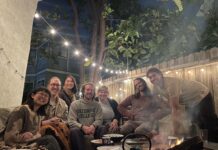








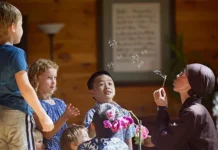






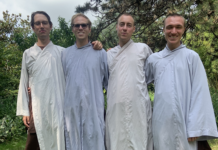
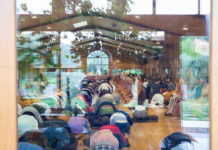
TENGO MAS DE DOS HORAS NAVEGANDO POR ESTA PAGINA, HE LEÍDO VARIOS ARTICULO COMPLETOS Y OTROS DE REOJO, Y ESTOY FASCINADA, HE APRENDIDO MUCHO . CADA VEZ ME COMPROMETO MAS CON MI PRACTICA Y ESTOY FELIZ DE SABER QUE HAY MUCHA GENTE COMPROMETIDA Y ESCRIBIENDO SOBRE TANTAS EXPERIENCIAS. GRACIAS !!!!!